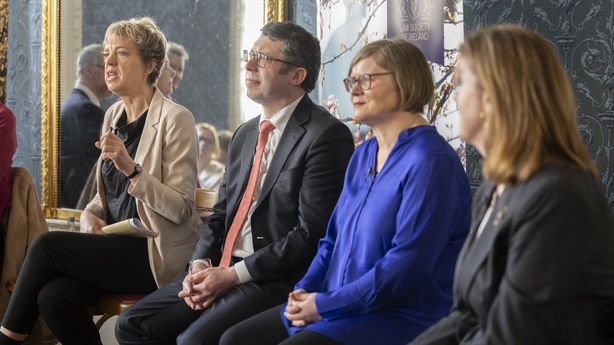Minister for Integration Roderic O'Gorman has said a yes vote in next month's care referendum will strengthen his hand in securing funding for disability services and carers in the next budget.
At a discussion on the forthcoming family and care referendums, hosted by the Law Society of Ireland, the minister said a yes vote will be binding on future governments.
He said there are "huge gaps" in supports for people with disabilities, and he hopes to secure funding for services including personal assistant hours and more respite hours.
Dismissing claims that a yes vote would have little practical benefit for carers, he said: "When you are in a Cabinet decision, when you are in a budget discussion, the fact that there is a Constitutional requirement influences those discussions, it has a meaning, it has an impact."
He added: "If we have a yes vote on the care referendum, for the first time, we will have that clear Constitutional obligation, that onus on the State to support care – to support the care of mams and dads, for their children, grown children, for their elderly parents and for family members with a disability.
"That does not exist now. It will exist and it will be binding for all future governments."

But no campaigners said a referendum defeat would lead to a more open conversation in the future on how to honour the work of carers.
Independent Senator Ronan Mullen, who is advocating a no vote, said it would lead to a discussion on "what do we need to put into legislation to deal with the real day to day struggles of carers who do so much for society, economic and otherwise".
There will be two referendums on two separate ballot papers on 8 March.
One will be on whether to change Article 41.1 to say the State "recognises the family whether founded on marriage or on other durable relationships".
It would also change Article 41.3 which says that "the State pledges itself to guard with special care the institution of marriage" to remove the words "on which the family is founded".
The second referendum will be on whether to take out Article 41.2, which says that "by her life within the home, woman gives to the state a support without which the common good cannon be achieved" and that "the State shall endeavour to ensure that mothers shall not be obliged by economic necessity to engage in labour to the neglect of their duties in the home".
It would be replaced with a new Article 42B which would recognise care by members of a family to one another by reason of the bonds that exist between them
Mr Mullen said there was an "appalling process" in devising the wording of both referendums.
He said the Government was seeking to undermine the role of homemakers while doing nothing for carers.
He said: "To my mind it’s a cynical Government agenda that involves getting rid of a reference to 'mother’ - funnily enough at a time when we are in the middle of the culture wars - getting rid of a referenced to woman that is actually very respectful of women and doing nothing to the State’s obligation to carers inside or outside the home."
Journalist and barrister Brenda Power said a yes vote would "copper-fasten and validate the really inadequate care provisions that currently exist".
She described the proposed provision as a "word salad of a totally meaningless replacement".
Labour Party leader Ivana Bacik told the panel that her party would be supporting a "yes yes and…" vote, meaning it would have to be followed up by meaningful policies to support care.
"Yes yes to both propositions, and then we will use the new text, valuing care for the first time in the Constitution and using that as a stepping stone in which we build a more effective and a better and more robust valuing framework for care," she said.
Orla O’Connor of the National Women’s Council said that by voting yes, people will be sending a message to this Government and future governments around what needs to change on care.
"Things like public services in terms of childcare, in terms of rights to personal assistants and supports for disabled people, things like universal pensions and better paid leave," se added.
Catherine Day, Chair of the Citizens Assembly on Gender Equality, which recommended stronger wording to include care outside of the home, said its members wanted the reference to a woman’s life in the home out of the Constitution.
"They didn’t want that hangover of another time, because they felt it had an influence. They felt it reflected a social time that has gone," she said.






